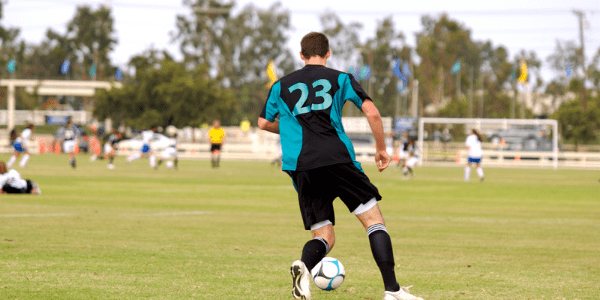
Are You Okay with Making a Mistake in a Soccer Match?
In every soccer game, mistakes are made. Ineffective crosses, shots off target, inaccurate passes, and yellow cards are a part of the game. Some soccer players quickly learn from mistakes, while others allow mistakes to take over their game.
One mistake may be enough to get stuck in your head and throw off your game. Even worse, some mistakes can affect your performance in the following games.
Many coaches try to help their players after a costly mistake by telling them, “Move on. You have to forget about that mistake.”
However, in that situation, you would probably think, “How? Tell me exactly how you want me to forget the mistake that cost our team a goal?”
No player wants to think about their mistakes constantly. They just don’t know how to move on after a mistake. Learning an effective strategy to deal with mistakes empowers players and improves their mental strength.
Recovering From a Mistake
In the 2022 World Cup, the United States Men’s National Team had a 1-0 lead in the first half and controlled the ball for most of the first 45 minutes. With eight minutes remaining in the game, it appeared as if the US would win their first game of the tournament.
However, in the 82nd minute, US center-back Walker Zimmerman fouled Gareth Bale leading to a penalty kick. Bale scored, and the game ended in a 1-1 tie.
After the game, Zimmerman recognized he had made a mistake but insisted he would not let his error affect his play during the rest of the tournament.
ZIMMERMAN: “You know, sometimes you just gotta shrug it off and roll with it. It happened. Move forward. There’s not much time to dwell on it. It’s not the first PK I’ve given up, and it’s not the last one I’ll ever give up. You can learn from it. I haven’t seen it back yet, so I’d like to see if there’s anything we could do differently, whether before or in my actions. Hopefully, we correct those things going into the next game.”
When you understand that mistakes will happen and that no player is immune to them, it is easier to accept them and rebound quicker. That’s not to say you won’t be upset after a mistake; you won’t allow that mistake to take you mentally out of your game.
When you put mistakes behind you, you can focus on what is in front of you.
Rebounding from Mistakes, you have three choices:
- You can focus on the mistake, which leads to a negative emotional reaction and possibly more mistakes.
- You can focus on the future and become anxious on the pitch.
- You can focus on keeping your head in the game and push forward.
Understanding how you typically respond to mistakes and how your response affects your game are the first steps to learning how to stay focused on the field.
Related Sports Psychology Articles
- How to Overcome Mistakes in Soccer
- Help Players Stay Composed After Mistakes
- How Do You Respond To Mistakes?
- Subscribe to The Sports Psychology Podcast on iTunes
- Subscribe to The Sports Psychology Podcast on Spotify
Download a free sports psychology report to improve your mental game!
Learn more about our one-on-one mental game coaching.
Boost Confidence in Soccer

“Soccer Confidence 2.0” 3-CD and Workbook program is the most comprehensive mental game program we’ve offered to the public. We’re virtually giving away all our mental game secrets for the incredibly low price of only $197.00 including the free bonuses!
“Soccer Confidence” is a complete brain dump of the TOP NINE mental training sessions we teach our soccer players to help them boost their mental game and improve consistency – from how to mentally prepare for games to performing under pressure to building unstoppable confidence.
